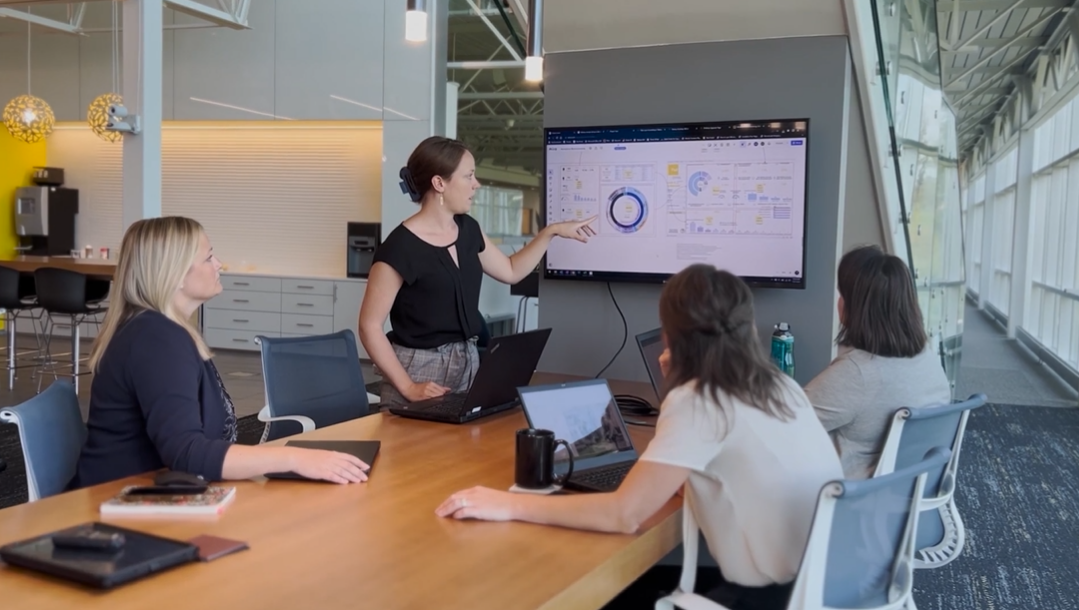Design Research
Featured Project: Post Occupancy Evaluation of a Medical Education Building
As a Design Research Analyst, DeVore led many post occupancy evaluation (POE) projects, one of which aimed to understand the successes and areas of improvement in a medical education building designed by Flad Architects.
DEFINE METRICS: Working with the building designers and Medical School Dean, they defined the research questions and metrics that would be measured in the POE based on specific occupant needs as well as wider industry trends.
DESIGN & CONDUCT A RESEARCH STUDY: From there, DeVore designed the research methodologies that would help the team answer those research questions and conducted the study using occupant surveys, occupant interviews, and a variety of on-site observational methods.
ANALYZE DATA AND UNCOVER INSIGHTS: The resulting quantitative and qualitative data provided important perspectives on how students and faculty were using the space and their resulting satisfaction and wellbeing. Upon analyzing the data, DeVore uncovered insights into the aspects of programming and spatial design that were fostering a vibrant learning culture and which aspects could be transformed to create a more supportive and healthy experience.
FUTURE RECOMMENDATIONS: Using those insights, she helped the Medical School create future plans for the space that included options for various levels of resource investment and impact. Eventually, when they decided to build an addition onto the space, the data were used to decide factors such as the layout of hallways and common spaces to best foster spontaneous interactions among students and faculty, which were shown in the data to increase emotional health, sense of belonging, and educational success.
SHARE THE STORY: After the completion of the POE project, DeVore presented the story and outcomes to Flad designers to foster continuous improvement within the company’s design processes. The project was also selected to be shared at a National Tradeline Space Strategies conference in 2023, where DeVore, the building architect, and the Dean of the medical school co-presented on the innovative design research process and resulting data that showed replicable design and building management strategies that support healthy, social learning environments.
Strategic Planning & Process Improvement
As a Design Research Analyst, DeVore helped build a new Innovation & Analytics team within Flad Architects. This required creativity, patience, and consistent reflection to assess the impact of the team’s design research work and create strategic plans to continuously improve that impact.
With multiple years of design research experience, DeVore was able to reflect on the successes and areas of improvement related to the team’s design research projects. Using that experience and research on industry trends, she used systems mapping techniques to visualize where in the design research process issues were arising. In collaboration with her team, she led a creative exercise to brainstorm strategies to solve these issues. Finally, DeVore developed a strategic plan that took into account the team’s mission, framed goals for the following year based on areas of improvement, and documented strategies to reach these goals.
Human-Centered Systems Thinking
With a certificate in Human-Centered Systems Thinking (HCST) from IDEO, DeVore was able to use her training to begin to solve complex systems-level problems as the team developed their design research practice. One particular challenge she studied involved how to integrate the data and insights collected by design researchers into the architectural design process more fully.
By following the HCST framework, she was able to work with stakeholders across the company to understand and map the design process from many diverse perspectives. This work uncovered insights into gaps within the firm’s processes where designers and design researchers could benefit from more collaboration and the HCST framework provided tools that helped DeVore implement new initiatives that resulted in more trust and information-sharing between disciplines.




